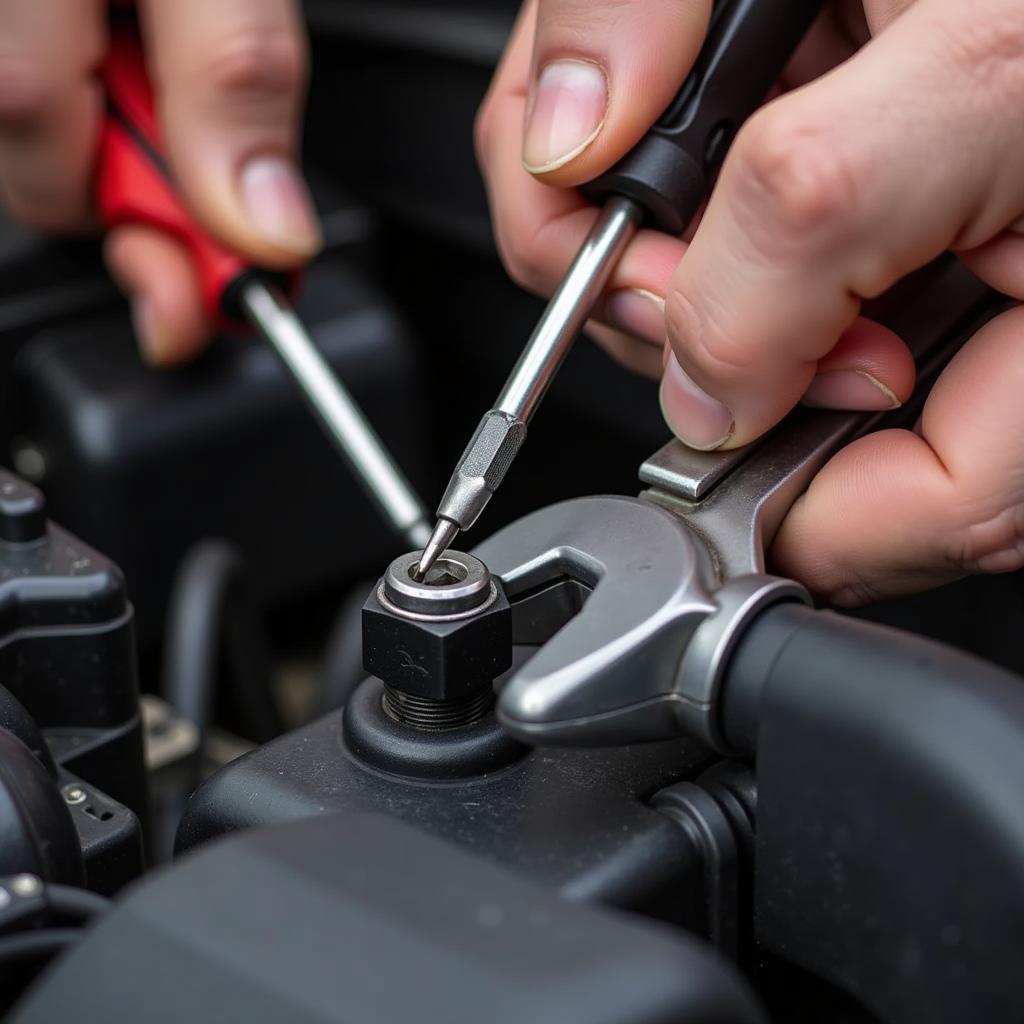Having the right tool sizes in your car can be a lifesaver, whether you’re dealing with a flat tire, a loose battery terminal, or a minor mechanical issue. Knowing which tool sizes to keep in your car is crucial for handling common roadside emergencies and even performing some basic maintenance. This guide will provide you with a comprehensive list of essential tool sizes, explaining why they’re important and how they can help you stay prepared on the road.
Why Keeping the Correct Tool Sizes Matters
Imagine being stranded on a dark, deserted road with a flat tire. You have a spare, but your lug wrench is the wrong size. This scenario highlights the importance of carrying the correct tool sizes. It’s not just about having tools; it’s about having tools that actually fit your car’s components. Using the wrong size can lead to stripped bolts, damaged parts, and ultimately, more frustration. A small investment in the right tools can save you significant time, money, and headaches down the road. For a quick overview of some handy tools, check out our guide on pocket tools for car.
 Essential Tool Sizes for Car Maintenance
Essential Tool Sizes for Car Maintenance
Must-Have Tool Sizes for Every Driver
Here’s a breakdown of essential tool sizes categorized by their function:
Wrench Sizes for Wheel Changes and Basic Repairs
- Lug Wrench: The most crucial tool for changing a tire. Ensure your lug wrench fits your car’s lug nuts. Common sizes include 19mm, 21mm, and 22mm. Check your owner’s manual for the correct size.
- Adjustable Wrench: A versatile tool for various tasks, a 6-inch or 8-inch adjustable wrench is a good choice. It can handle different bolt and nut sizes.
- Combination Wrench Set: A set of combination wrenches (metric and SAE) covering sizes from 8mm to 19mm is ideal for basic repairs and adjustments.
Screwdriver Sizes for Electrical and Interior Work
- Phillips Head Screwdrivers: Sizes #1 and #2 are most common for automotive applications, covering various screw sizes found in interior panels, lights, and other components.
- Flathead Screwdrivers: A small and medium flathead screwdriver are useful for prying, scraping, and tightening slotted screws.
- Multi-Bit Screwdriver: A multi-bit screwdriver with interchangeable tips can save space and offer versatility.
 Screwdriver and Wrench Sizes for Car
Screwdriver and Wrench Sizes for Car
Socket Sizes for More Advanced Repairs
- Socket Set (Metric and SAE): A socket set with a ratchet handle, extensions, and a variety of sizes (from 10mm to 19mm for metric and 3/8 inch to 3/4 inch for SAE) will enable you to tackle more complex jobs. Consider a set with both deep and shallow sockets.
Other Essential Tools and Their Sizes
- Pliers: Needle-nose pliers and slip-joint pliers are indispensable for gripping, cutting, and bending wires and small parts.
- Tire Pressure Gauge: Essential for maintaining proper tire pressure. A digital or pencil-style gauge works well.
- Jumper Cables: Choose cables with a gauge of 4 or 6 for reliable jump-starting.
- Duct Tape: Useful for temporary repairs and securing items.
If you work on German cars, having a set of metric tools for German cars is essential. You can find a suitable set at metric tools for german cars. Having a good foundation of car repair basic tools is crucial, so ensure you understand the basics before attempting complex repairs. See our guide on car repair basic tools for more information.
What About Tool Organization?
Keeping your tools organized is just as important as having the right sizes. A toolbox or tool bag prevents tools from rattling around and makes them easy to find in an emergency. Consider a dedicated tool organizer designed for car trunks.
Conclusion: Be Prepared with the Right Tool Sizes
Having the correct tool sizes in your car is a smart investment in your safety and peace of mind. Knowing how to use these tools is equally crucial. By keeping a well-stocked and organized tool kit, you’ll be equipped to handle common roadside emergencies and even perform some basic maintenance, saving yourself time and money in the long run. For those in Liverpool looking for diagnostic solutions, consider our free car diagnostic reader liverpool page. Another helpful tool for maintaining your car’s battery health is the Vonhaus car battery trickle charger with advanced vehicle diagnostics 7a.
FAQ
- What are the most common tool sizes for car repairs? Common sizes include 10mm to 19mm for metric wrenches and sockets, and 3/8 inch to 3/4 inch for SAE.
- Do I need both metric and SAE tools? While most modern cars use metric fasteners, some older models may have SAE fasteners, so having both is recommended.
- Where can I find the correct lug nut size for my car? Your car’s owner’s manual will specify the correct lug nut size.
- What type of toolbox is best for car use? A compact, durable toolbox or tool bag designed for car trunks is ideal.
- What are some basic car maintenance tasks I can do with these tools? You can change a tire, tighten loose bolts, replace a battery, and perform other minor repairs.
Need more detailed information? Check out our article on pocket tools for car.
For any assistance or inquiries, please reach out to our 24/7 customer support via WhatsApp: +1(641)206-8880, Email: [email protected] or visit us at 910 Cedar Lane, Chicago, IL 60605, USA.

Leave a Reply